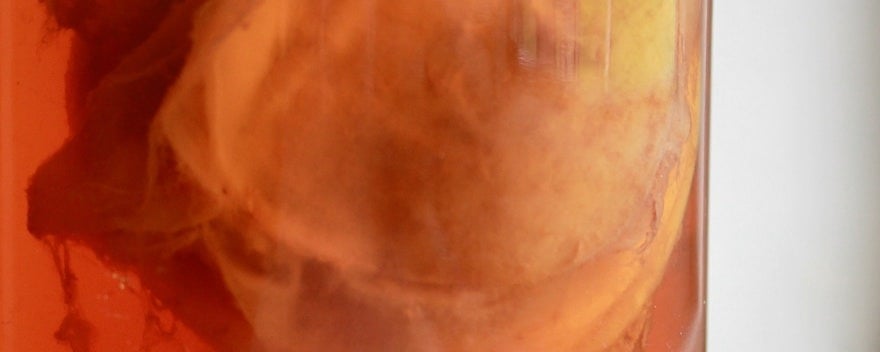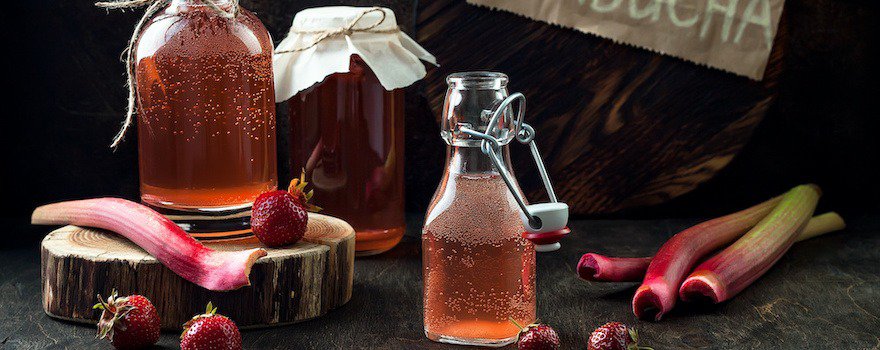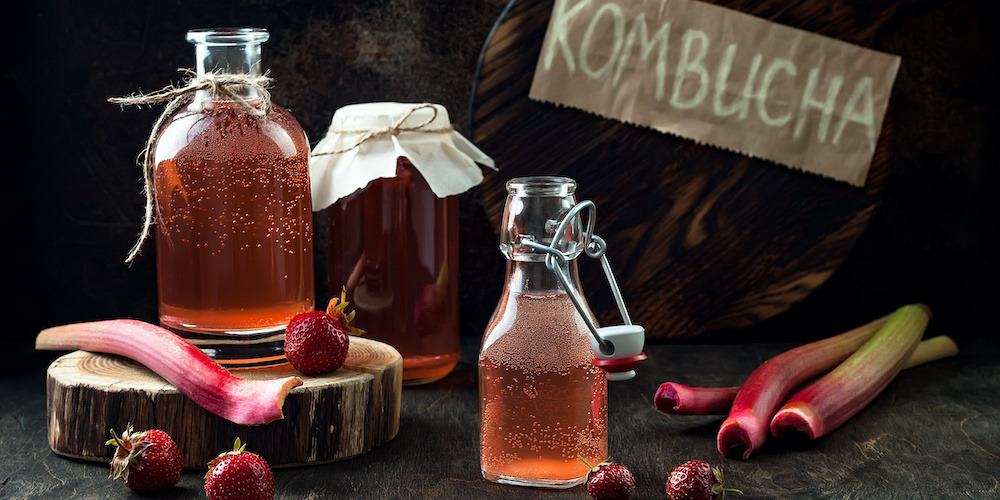BENEFITS OF KOMBUCHA
✓ Probiotic: enriches the microbiota
✓ Fights against pathogenic bacteria
✓ Source of antioxidants
✓ Reduces cholesterol levels
What is kombucha?
Kombucha is a traditional drink originating from China, specifically the region of Manchuria, in the northeast part of the country. Like kefir, it is a fermented drink.
It is obtained through a particular process: tea (green or black) and sugar (cane sugar or honey) are fermented in a culture of yeasts and bacteria. These microorganisms act in symbiosis and form what we call kombucha.
It is also known as “tea mushroom” due to the shape it takes as it ferments. After about ten days, you get a fizzy drink, similar to cider with a vinegar-like taste.
This beverage is very popular outside Asian borders, especially in the United States and Europe, due to its multiple properties.

Its beneficial action on the microbiota is one of the first advantages identified by researchers. But kombucha is also interesting for improving diabetes and fighting against certain pathogenic bacteria. Finally, it exerts a powerful antioxidant action and reduces cholesterol levels.
Nutritional composition
- 14 amino acids
- Vitamins: B1, B2, B5, B6, B9, B12, C, D
- Minerals and trace elements: iron, manganese, magnesium, potassium, calcium, copper, zinc
- Enzymes
- Organic acids: acetic acid, gluconic acid, lactic acid
- Bacteria
- Yeasts
- Antioxidant actives: polyphenols, flavones
- Sugars
The benefits of kombucha
♻️ Enriches the microbiota
Kombucha is made of natural probiotics, beneficial microorganisms for the microbiota. It has a “live” composition, made of good bacteria, yeasts, and enzymes. Notably, bacteria from the genus Acinetobacter and Gluconobacter are present, which help produce organic acids important for the human body.
This study from Jadavpur University (India), conducted in a laboratory during the fermentation of kombucha, shows the microbial composition of the drink.
🍭 Improves diabetes
Consuming kombucha has beneficial effects on diabetes. This drink has a hypoglycemic action, meaning it reduces blood glucose levels. It achieves this by inhibiting the activity of amylase and lipase, enzymes secreted by the pancreas and involved in the digestion of sugars and fats. By suppressing their activity, the drink decreases the level of blood sugar after eating a meal (postprandial blood sugar).
This study from the University of Sfax (Tunisia), conducted on rats, shows how kombucha reduces blood sugar levels.
🛡 Fights against pathogenic bacteria
Kombucha also exerts an antibacterial action. Thus, it fights against a number of microorganisms and pathogenic bacteria. The acetic acid it contains would be responsible for this action. It has proven particularly effective against the bacteria Escherichia coli and Salmonella.
This study from the TNO Nutrition and Food Research Institute (Netherlands), conducted on a kombucha culture, shows its antimicrobial activity.
🥝 Source of antioxidants
Kombucha contains a high quantity of antioxidants. It notably includes polyphenols that prevent cell oxidation, lipid peroxidation (responsible for premature aging), and limit DNA damage.
This drink increases glutathione levels, which plays a protective role for cells, and reduces the activity of the enzyme GPX (glutathione peroxidase) which oxidizes glutathione.
This study from the Defense Institute of Physiology and Allied Sciences in Delhi (India), conducted on rats, shows the powerful antioxidant properties of kombucha.
🍳 Reduces cholesterol levels
Kombucha is a health drink that may be beneficial in cases of hypercholesterolemia. Its consumption can reduce LDL cholesterol levels (or “bad cholesterol”) and increase HDL cholesterol levels (or “good cholesterol”). This activity is thought to be due to the presence of D-saccharic acid-1,4-lactone (DSL).
This study from the University of Sfax (Tunisia), conducted on rats, shows the beneficial effects of kombucha on hypercholesterolemia.

How to consume kombucha?
Bottled in commerce
It is possible to find bottled kombucha, ready to consume, in stores. The drink is generally available in specialized shops, organic stores or online. The production process has a direct impact on its quality.
Therefore, we recommend choosing a product that is unpasteurized, preserving all its probiotics and microorganisms. Also, favor a beverage without preservatives and added sugars.

Homemade
If you wish, you can make your own homemade elixir. To do this, you will need:
- water
- cane sugar
- tea bags
- kombucha beverage ferment (in powder or disc form)
Recipe
- Prepare your tea in a large glass jar (do not use ceramic or metal containers) and incorporate the ferment.
- Cover with a cloth and let it ferment for 7 to 10 days at room temperature.
- The longer you let your drink sit, the less sweet and more acidic it will be: try it according to your preferences.
- Then filter your drink and store it in the refrigerator (up to 4 days maximum).

Consume sustainably: opt for organic, local, and fair-trade kombucha
✓ In response to growing demand, some French producers have started making organic kombucha using ingredients from organic farming. Some raw materials, such as tea, can also come from fair trade.
✓ Also, prefer a beverage made artisanally and fermented in France. There are now flavored drinks: apple, turmeric, ginger, cinnamon, lime, mint… In this case, check that these are natural flavors.
Dosage
Kombucha is a fairly sweet and slightly alcoholic drink (less than 1% alcohol) that should not be consumed in excess. Generally, it is recommended to drink a maximum of 2 to 3 glasses per day. Consumption should be gradual to allow the body to adjust.
Contraindications and side effects
Kombucha consumption is not dangerous, but there are some contraindications :
- As a precaution, it is advised against for pregnant and breastfeeding women and young children
- Individuals with immune disorders or liver or kidney diseases should avoid consumption
- Due to its high sugar content, diabetic individuals should consult their doctor before drinking it
Consumption has some side effects :
- Bloating
- Nausea
- Allergic reactions
- Digestive disorders
If you experience side effects, stop consumption and consult a doctor.
History, culture, and market
Consumed for over 2000 years, kombucha was developed for Chinese Emperor Qin Shi Huang, in search of an “elixir of life”.
Since then, the drink is appreciated worldwide, notably in Japan, Korea, Germany, Russia, and the United States. This growing success has also intrigued large multinationals such as Coca-Cola and Pepsi, which have decided to acquire kombucha manufacturers.
Dossier created by Julia Perez
Sources and scientific studies
Somnath Chakravorty, Semantee Bhattacharya, Antonis Chatzinotas, Writachit Chakraborty, Debanjana Bhattacharya, Ratan Gachhui, 2016. Kombucha tea fermentation: Microbial and biochemical dynamics.
Ahmed Aloulou, Khaled Hamden, Dhouha Elloumi, Madiha Bou Ali, Khaoula Hargafi, Bassem Jaouadi, Fatma Ayadi, Abdelfattah Elfeki, and Emna Ammar, 2012. Hypoglycemic and antilipidemic properties of kombucha tea in alloxan-induced diabetic rats.
G Sreeramulu, Y Zhu, W Knol, 2000. Kombucha fermentation and its antimicrobial activity.
P Dipti, B Yogesh, A K Kain, T Pauline, B Anju, M Sairam, B Singh, S S Mongia, G Ilavazhagan Devendra Kumar, W Selvamurthy, 2003. Lead induced oxidative stress: beneficial effects of Kombucha tea.
Khaled Bellassoued, Ferdaws Ghrab, Fatma Makni-Ayadi, Jos Van Pelt, Abdelfattah Elfeki, Emna Ammar, 2015. Protective effect of kombucha on rats fed a hypercholesterolemic diet is mediated by its antioxidant activity.



